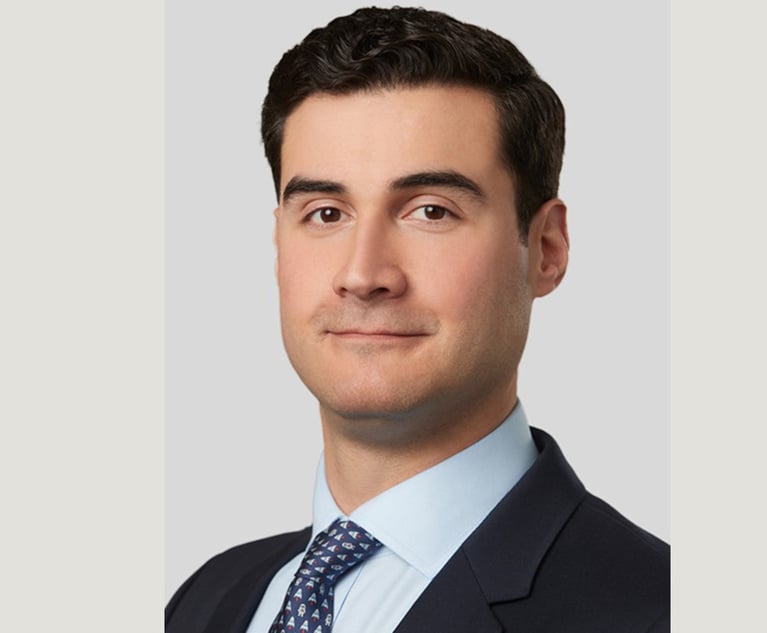Why UK law firms are still caught between lockstep and a hard place
As Clifford Chance this month voted once again to overhaul its lockstep, could too much reform prove counterproductive to magic circle firms?
May 31, 2017 at 07:06 AM
5 minute read
The original version of this story was published on Law.com
The topic of lockstep compensation somehow manages to be simultaneously divisive, critically important, and – for those not writing the cheques or cashing them – numbingly boring. I sympathise. But bear with me.
The elite UK law firms have spent years trying to inject some much-needed flexibility into what is an inherently inflexible remuneration system, with varying degrees of success. They have tried bonuses, differential locksteps for international offices, and so-called super-point packages, which are used to reward star performers. Perhaps most effectively, managers typically now have the ability to alter an individual's equity share – by holding a partner at a certain level on the 'ladder' for more than one year, accelerating their progression, or even reducing their points, if necessary.
Yet the tinkering continues, with Clifford Chance (CC) partners voting earlier this month to approve yet another round of reforms designed to better attract and retain top performers. The firm's lockstep will be stretched, while the method for calculating and allocating profit units will be altered so that big billers can receive a larger slice of the pie. Each partner's profit share will also be reassessed as part of a comprehensive overview.
The moves by CC and other firms raise the question: could too much lockstep reform turn out to be counterproductive?
It's fair to say that the magic circle firms are never going to generate Wall Street levels of profitability. But they are actually more competitive than you might think. Freshfields Bruckhaus Deringer's average profit per lawyer, for example, is almost identical to Dechert's – and ahead of the likes of Shearman & Sterling, Sidley Austin and Weil, Gotshal & Manges. The UK firms do generally have lower average profit per equity partner than their US peers, but this is partly because they are more generous with their equity.
Nevertheless, thanks to the constraints of lockstep, they are undoubtedly left at a competitive disadvantage.
One of the major problems with lockstep, which in its purest form sees partners remunerated based on seniority, is that it essentially underpays or overpays everyone. Profit pools are a zero-sum game, after all. But that has always been the case, so why the recent determination to change things?
Simple: US law firms.
The magic circle used to call the shots and have their own way in London – and in most other markets in which they operated, other than the US, of course. They had the best clients, the best work and were able to pay more than anyone else, which never hurts when it comes to recruitment.
The mass influx of firms from across the Atlantic has changed all that. Even the most profitable UK firms aren't able to match the bumper packages on offer at some American rivals – particularly once you factor in the significant weakening of the British pound against the US dollar during the past two years.
The simplest solution would be to ditch lockstep entirely. But that's not going to happen – at least not in the foreseeable future. Lockstep is such a deeply ingrained part of the magic circle ethos that dropping it would be almost inconceivable. As Allen & Overy's senior partner Wim Dejonghe says: "It's clear that lockstep has its limits, but it's also clear that it is at the heart of our success."
All that's left is to rework what they've got in an attempt to make a round peg fit a multifaceted hole. The result, somewhat inevitably, is an imperfect compromise.
The consensus among consultants and headhunters is that the various changes made by the firms have not gone far enough. The modifications certainly don't seem to have done much to stem the loss of talent to American competitors, although the extent of this movement is often overstated. (It's more of a steady drip than a flood, and is driven in part by the fact that US firms are still expanding in London, whereas their UK counterparts are not.) Still, seeing even a handful of top partners walk out of the door each year to join rival firms must be getting pretty old by now.
The truth, however, is that the magic circle firms are in an almost impossible position. If they don't modify their locksteps aggressively enough, they won't be able to reward their top billers in a competitive manner, and some are likely to leave.
But if they are too aggressive and stray too far from the lockstep path, they risk losing the cultural differentiation that they have worked so hard to protect, at which point star partners may as well take the money and join a more merit-based US firm.
"That is the challenge: the balancing act between maintaining your culture but being able to offer attractive compensation packages," comments Dejonghe. "You can't push it too far."
Finding that sweetspot will take strong management and a willing partnership. And probably a degree of trial and error. I suspect the magic circle firms aren't done tinkering just yet.
Chris Johnson is chief global correspondent at The American Lawyer.
This content has been archived. It is available through our partners, LexisNexis® and Bloomberg Law.
To view this content, please continue to their sites.
Not a Lexis Subscriber?
Subscribe Now
Not a Bloomberg Law Subscriber?
Subscribe Now
NOT FOR REPRINT
© 2025 ALM Global, LLC, All Rights Reserved. Request academic re-use from www.copyright.com. All other uses, submit a request to [email protected]. For more information visit Asset & Logo Licensing.
You Might Like
View All

Signaling Growth Goals, Some Law Firms Promote Record Partner Classes

How I Made Partner: 'Avoid Getting Stuck in a Moment,' Says Federico Cuadra Del Carmen of Baker McKenzie

How I Made Partner: 'Find Your Niche and Become the Go-To Person,' Says Shawn Hendricks of Stradley Ronon Stevens & Young
Trending Stories
- 1Stevens & Lee Names New Delaware Shareholder
- 2U.S. Supreme Court Denies Trump Effort to Halt Sentencing
- 3From CLO to President: Kevin Boon Takes the Helm at Mysten Labs
- 4How Law Schools Fared on California's July 2024 Bar Exam
- 5'Discordant Dots': Why Phila. Zantac Judge Rejected Bid for His Recusal
Who Got The Work
Michael G. Bongiorno, Andrew Scott Dulberg and Elizabeth E. Driscoll from Wilmer Cutler Pickering Hale and Dorr have stepped in to represent Symbotic Inc., an A.I.-enabled technology platform that focuses on increasing supply chain efficiency, and other defendants in a pending shareholder derivative lawsuit. The case, filed Oct. 2 in Massachusetts District Court by the Brown Law Firm on behalf of Stephen Austen, accuses certain officers and directors of misleading investors in regard to Symbotic's potential for margin growth by failing to disclose that the company was not equipped to timely deploy its systems or manage expenses through project delays. The case, assigned to U.S. District Judge Nathaniel M. Gorton, is 1:24-cv-12522, Austen v. Cohen et al.
Who Got The Work
Edmund Polubinski and Marie Killmond of Davis Polk & Wardwell have entered appearances for data platform software development company MongoDB and other defendants in a pending shareholder derivative lawsuit. The action, filed Oct. 7 in New York Southern District Court by the Brown Law Firm, accuses the company's directors and/or officers of falsely expressing confidence in the company’s restructuring of its sales incentive plan and downplaying the severity of decreases in its upfront commitments. The case is 1:24-cv-07594, Roy v. Ittycheria et al.
Who Got The Work
Amy O. Bruchs and Kurt F. Ellison of Michael Best & Friedrich have entered appearances for Epic Systems Corp. in a pending employment discrimination lawsuit. The suit was filed Sept. 7 in Wisconsin Western District Court by Levine Eisberner LLC and Siri & Glimstad on behalf of a project manager who claims that he was wrongfully terminated after applying for a religious exemption to the defendant's COVID-19 vaccine mandate. The case, assigned to U.S. Magistrate Judge Anita Marie Boor, is 3:24-cv-00630, Secker, Nathan v. Epic Systems Corporation.
Who Got The Work
David X. Sullivan, Thomas J. Finn and Gregory A. Hall from McCarter & English have entered appearances for Sunrun Installation Services in a pending civil rights lawsuit. The complaint was filed Sept. 4 in Connecticut District Court by attorney Robert M. Berke on behalf of former employee George Edward Steins, who was arrested and charged with employing an unregistered home improvement salesperson. The complaint alleges that had Sunrun informed the Connecticut Department of Consumer Protection that the plaintiff's employment had ended in 2017 and that he no longer held Sunrun's home improvement contractor license, he would not have been hit with charges, which were dismissed in May 2024. The case, assigned to U.S. District Judge Jeffrey A. Meyer, is 3:24-cv-01423, Steins v. Sunrun, Inc. et al.
Who Got The Work
Greenberg Traurig shareholder Joshua L. Raskin has entered an appearance for boohoo.com UK Ltd. in a pending patent infringement lawsuit. The suit, filed Sept. 3 in Texas Eastern District Court by Rozier Hardt McDonough on behalf of Alto Dynamics, asserts five patents related to an online shopping platform. The case, assigned to U.S. District Judge Rodney Gilstrap, is 2:24-cv-00719, Alto Dynamics, LLC v. boohoo.com UK Limited.
Featured Firms
Law Offices of Gary Martin Hays & Associates, P.C.
(470) 294-1674
Law Offices of Mark E. Salomone
(857) 444-6468
Smith & Hassler
(713) 739-1250









